Human Chorionic Gonadotropin (HCG) has long been a critical element in fertility treatments and reproductive science. Often called the “pregnancy hormone,” HCG is a hormone produced by the placenta after implantation. Its role in supporting the early stages of pregnancy is well known, but its applications in improving female fertility are equally significant. In this comprehensive review, we will explore the mechanisms, roles, and clinical applications of HCG in fertility treatments.
HCG (human chorionic gonadotropin) plays a key role in fertility treatments by triggering ovulation in women. In assisted reproduction techniques, HCG is commonly used to induce the release of mature eggs from the ovaries, facilitating the chances of successful conception.
Human chorionic gonadotropin (HCG) works in the female reproductive system by acting like luteinizing hormone (LH). After fertilisation and implantation, the placenta releases HCG into the bloodstream. HCG keeps the corpus luteum active and signals it to continue producing progesterone. Progesterone maintains the uterine lining and supports early pregnancy by creating a stable environment for embryo implantation and growth.
HCG does not control early egg growth in the ovaries. Follicle-stimulating hormone (FSH) manages follicle development, while HCG triggers the final maturation and release of the egg during ovulation. In fertility treatments, clinicians use HCG to control the timing of ovulation and, in some cases, to support progesterone production during the luteal phase.
Visit the main HCG category page at Direct Peptides Estonia to explore product variations and discover other uses for this peptide.
Ovulation induction is commonly used in infertility treatments, with HCG playing a key role. Administering HCG helps trigger the final maturation of eggs and their release from follicles, which is crucial for timed intercourse, intrauterine insemination (IUI), or in-vitro fertilisation (IVF).
The effectiveness of HCG in ovulation induction is well-supported. The Journal of Human Reproductive Sciences (2020) notes that HCG successfully mimics the natural LH surge, leading to ovulation. This increases the likelihood of fertilisation and pregnancy, making HCG an important tool in fertility clinics worldwide.
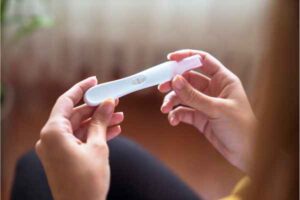 HCG plays a key role not just in ovulation induction but also in pregnancy testing and monitoring. Pregnancy tests work by detecting HCG in urine or blood, confirming pregnancy just days after implantation. Early detection helps ensure timely prenatal care.
HCG plays a key role not just in ovulation induction but also in pregnancy testing and monitoring. Pregnancy tests work by detecting HCG in urine or blood, confirming pregnancy just days after implantation. Early detection helps ensure timely prenatal care.
During pregnancy, HCG levels are regularly checked to monitor the health and progress of the pregnancy. Abnormal levels can signal issues like ectopic pregnancy or miscarriage. Estonia Clinicians use HCG measurements to make important decisions about patient care, highlighting its significance in reproductive medicine.
HCG is a staple in fertility treatments, but there are alternatives that can achieve similar results. These alternatives work in different ways and can be suitable for patients who need a different approach. Notable options include Gonadorelin, Kisspeptin, and Human Menopausal Gonadotropin (HMG).
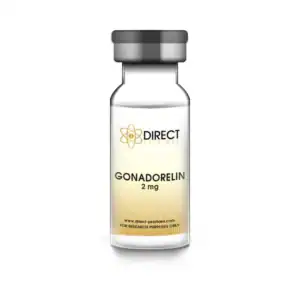 Gonadorelin, or Gonadotropin-Releasing Hormone (GnRH), is a synthetic version of a hormone important for regulating reproduction. It prompts the pituitary gland to release luteinising hormone (LH) and follicle-stimulating hormone (FSH), essential for inducing ovulation and developing follicles.
Gonadorelin, or Gonadotropin-Releasing Hormone (GnRH), is a synthetic version of a hormone important for regulating reproduction. It prompts the pituitary gland to release luteinising hormone (LH) and follicle-stimulating hormone (FSH), essential for inducing ovulation and developing follicles.
By closely imitating the body’s natural reproductive hormone signals, Gonadorelin, available from Direct Peptides, offers a controlled way to manage ovulation and serves as a viable alternative to HCG.
Kisspeptin, available from Direct Peptides, is a neuropeptide that helps control reproductive hormones in women. It works in the brain by activating cells in the hypothalamus that release Gonadotropin-releasing hormone, known as GnRH, triggers the pituitary gland to make LH and follicle stimulating hormone, which control ovulation.
These hormones control ovulation and support normal reproductive function. Research shows that kisspeptin plays a central role in keeping the reproductive hormone system working properly and is necessary for normal fertility.
Clinical studies show that kisspeptin can cause an LH surge and trigger ovulation in women receiving fertility treatment. Kisspeptin works through the body’s natural hormone pathways instead of directly acting on the ovaries. This allows better control of ovulation and may lower the risk of ovarian hyperstimulation syndrome compared with traditional ovulation triggers.
 Human Menopausal Gonadotropin (HMG) contains both LH and FSH and is derived from the urine of postmenopausal women.
Human Menopausal Gonadotropin (HMG) contains both LH and FSH and is derived from the urine of postmenopausal women.
It is commonly used in assisted reproductive technologies to stimulate the ovaries to produce multiple follicles.
With its dual action on LH and FSH, HMG is a strong alternative to HCG for patients undergoing in-vitro fertilisation (IVF). By supporting follicle development and ovulation, HMG is crucial in improving fertility outcomes. You can buy HMG from Direct Peptides.
While HCG is effective in fertility treatments, alternatives like Gonadorelin, Kisspeptin, and HMG offer valuable options for personalised care. Each provides unique mechanisms and benefits, expanding the possibilities for successful fertility treatments.
Explore Peptide Supplies at Direct Peptides for all your reconstitution requirements.
Navigating HCG fertility treatments can provoke a range of emotional responses in individuals. Patients often experience heightened stress levels due to the uncertainty surrounding treatment outcomes.
The emotional rollercoaster of hope and anxiety during each phase, from injections to pregnancy tests, can weigh heavily on mental well-being. Support systems and open communication with healthcare providers play a crucial role in managing the psychological impact of HCG fertility treatments.
When using HCG for fertility treatments, it’s important to know the potential side effects and risks. These include ovarian hyperstimulation syndrome (OHSS), reactions at the injection site, and the chance of multiple pregnancies due to increased fertility.
Regular monitoring by a healthcare provider during treatment is crucial to reduce these risks and address any concerns quickly. Discussing the administration and dosage of HCG with your care team can help manage and lower the chances of experiencing these side effects.
Navigating possible side effects and risks with HCG treatment is paramount for a successful fertility journey. Vigilance in monitoring possible outcomes like ovarian hyperstimulation syndrome (OHSS) and injection site reactions is crucial. Consulting your care team about any concerns, such as changes in body weight or unusual symptoms, is essential.
Understanding the expiration date and proper storage of the HCG injection is vital. Immediate medical attention for severe side effects is non negotiable. Education on potential risks ensures a safe and effective fertility treatment experience.
HCG plays a key role in fertility treatments, offering significant benefits for ovulation induction, pregnancy testing, and ART procedures. Its mechanisms and uses are well researched, providing important tools for fertility specialists.
Estonia Recent studies continue to broaden our understanding of HCG, leading to new treatment possibilities. For researchers and clinicians, keeping up with the latest developments in HCG research is essential. The future of HCG in boosting female fertility looks promising, with ongoing studies and clinical trials improving outcomes.
Shop ALL Peptide Nasal Sprays from Direct Peptides today, your trusted supplier of premium clinical grade peptides online.
[1] Betz D, Fane K. Human Chorionic Gonadotropin. [Updated 2023 Aug 14]. In: StatPearls Internet. Treasure Island (FL): StatPearls Publishing; 2024 Jan-.
[2] Cole LA. Biological functions of hCG and hCG-related molecules. Reprod Biol Endocrinol. 2010 Aug 24;8:102.
[3] Choi J, Smitz J. Luteinizing hormone and human chorionic gonadotropin: origins of difference. Mol Cell Endocrinol. 2014 Mar 5;383(1-2):203-13.
[4] Lunenfeld B, Bilger W, Longobardi S, Alam V, D’Hooghe T, Sunkara SK. The Development of Gonadotropins for Clinical Use in the Treatment of Infertility. Front Endocrinol (Lausanne). 2019 Jul 3;10:429.
[5] Mesen TB, Young SL. Progesterone and the luteal phase: a requisite to reproduction. Obstet Gynecol Clin North Am. 2015 Mar;42(1):135-51.
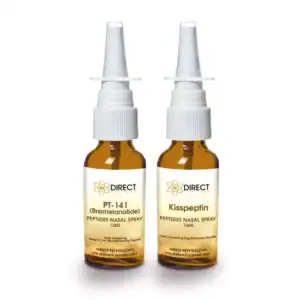
Kisspeptin PT-141 Nasal Stack
£51.65 – £94.30Price range: £51.65 through £94.30 Select options This product has multiple variants. The options may be chosen on the product page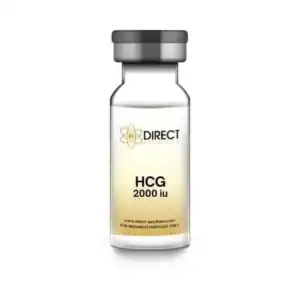
TWIN PACKS
HCG Peptide Vial
£19.76 – £51.26Price range: £19.76 through £51.26 Select options This product has multiple variants. The options may be chosen on the product page
HMG Pre-Mixed Pen 75iu Peptide
£41.08 – £110.92Price range: £41.08 through £110.92 Select options This product has multiple variants. The options may be chosen on the product page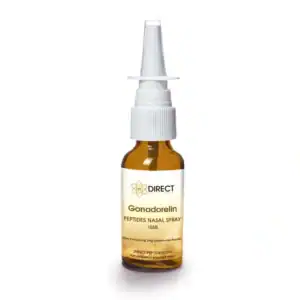
Gonadorelin Nasal Spray
£20.38 – £37.75Price range: £20.38 through £37.75 Select options This product has multiple variants. The options may be chosen on the product pageALL CONTENT AND PRODUCT INFORMATION AVAILABLE ON THIS WEBSITE IS FOR EDUCATIONAL PURPOSES ONLY.
DISCLAIMER: These products are intended solely as a research chemical only. This classification allows for their use only for research development and laboratory studies. The information available on our Estonia Direct Peptides website: https://direct-peptides.com is provided for educational purposes only. These products are not for human or animal use or consumption in any manner. Handling of these products should be limited to suitably qualified professionals. They are not to be classified as a drug, food, cosmetic, or medicinal product and must not be mislabelled or used as such.